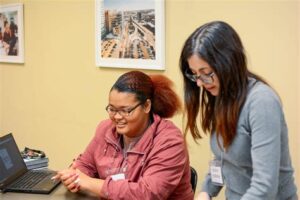Table of Contents
Looking for a meaningful way to give back? Consider volunteering as a reading tutor or mentor. Reading volunteer work allows you to make a positive impact on young minds, helping children develop essential literacy skills and fostering a love for reading. Join a local organization or school, dedicate your time, and help shape a brighter future for the next generation.
Engaging in reading volunteer work offers a unique opportunity to make a positive impact on individuals and communities alike. Not only does it allow for personal growth and development, but also contributes to the betterment of society as a whole. Whether you have a passion for literature or simply want to give back to those in need, volunteering your time to promote literacy can be a deeply rewarding experience. By immersing yourself in this fulfilling endeavor, you can help foster a love for reading, empower individuals with knowledge, and bridge educational gaps. In addition, volunteering in this capacity allows you to connect with diverse groups of people, learn about different cultures, and gain valuable insights into the challenges faced by disadvantaged individuals. Overall, reading volunteer work presents an incredible opportunity to make a difference while cultivating meaningful connections and expanding your own horizons.
Introduction
Volunteering is a selfless act that allows individuals to contribute their time and skills to make a positive impact in their communities. One area where volunteers are greatly needed is in reading programs. Reading volunteer work involves assisting children and adults in developing and enhancing their reading skills. This article will explore the importance of reading volunteer work and how it can benefit both volunteers and those they support.
The Importance of Reading
Reading is a fundamental skill that serves as the foundation for learning and success in all areas of life. It opens doors to knowledge, imagination, and critical thinking. Unfortunately, not everyone has equal access to quality education or resources to develop strong reading abilities. This is where reading volunteer work becomes crucial in bridging the gap and empowering individuals to reach their full potential.
Supporting Literacy Programs
Reading volunteer work often involves supporting literacy programs in schools, libraries, or community centers. Volunteers may assist teachers or librarians in organizing reading activities, selecting appropriate books, or even reading aloud to groups of children. By doing so, volunteers create a nurturing environment that encourages a love for reading and helps individuals develop important literacy skills.
One-on-One Tutoring
One of the most impactful aspects of reading volunteer work is providing one-on-one tutoring. Volunteers can work directly with individuals who struggle with reading, tailoring their approach to meet specific needs. This personalized attention helps build confidence, enhances comprehension, and improves overall reading abilities. Through patient guidance and encouragement, volunteers empower learners to overcome challenges and succeed academically.
Mentorship and Role Models
Reading volunteers often become mentors and role models for those they support. By fostering positive relationships, volunteers can inspire a love for reading and serve as examples of the benefits that come from developing strong literacy skills. They can share their own experiences, recommend books, and encourage regular reading habits, instilling a lifelong passion for learning.
Community Engagement
Reading volunteer work is not only about helping individuals; it also strengthens communities. Volunteers play an essential role in creating a sense of belonging and unity. They bring people together through shared interests and goals, promoting social interaction and community engagement. Through reading programs, volunteers create spaces where individuals can connect, learn from one another, and build strong bonds.
Personal Growth and Fulfillment
Engaging in reading volunteer work can lead to personal growth and fulfillment for the volunteers themselves. By making a difference in someone else’s life, volunteers experience a sense of purpose and satisfaction. They develop empathy, patience, and interpersonal skills while building stronger connections within their communities. Additionally, volunteering allows individuals to expand their knowledge and understanding of different cultures, perspectives, and experiences.
Building a Stronger Society
Reading volunteer work contributes to building a stronger, more inclusive society. By improving literacy rates and providing equal opportunities for all individuals, we create a foundation for social and economic progress. When everyone has access to quality education and resources, communities thrive, and individuals are empowered to pursue their dreams.
The Ripple Effect
The impact of reading volunteer work extends far beyond the immediate benefits. When individuals develop strong reading skills, they become active participants in their communities and the workforce. They are more likely to succeed academically, secure better job opportunities, and contribute positively to society. The ripple effect of reading volunteer work can lead to a brighter future for individuals, families, and entire communities.
Getting Involved
If you are passionate about reading and want to make a difference in the lives of others, consider getting involved in reading volunteer work. Reach out to local schools, libraries, or community centers to inquire about existing programs or opportunities to start your own. Your time and dedication can help transform lives and create a more literate, compassionate society.
In conclusion
Reading volunteer work is a powerful way to support literacy, foster personal growth, and build stronger communities. By dedicating your time and skills to help individuals develop their reading abilities, you contribute to a more inclusive society where everyone has equal access to knowledge and opportunities. Start your volunteering journey today and be a catalyst for positive change through the gift of reading.
The Importance of Reading Volunteer Work
Reading volunteer work plays a vital role in promoting literacy and instilling a love for reading in individuals of all ages. By dedicating their time and effort to this cause, volunteers actively contribute to the enhancement of cognitive skills, language development, and critical thinking abilities. Furthermore, such volunteer work can have a profound impact on fostering a more inclusive and equal society by bridging educational gaps and providing access to literature for marginalized communities.
Responsibilities of Reading Volunteers
Reading volunteers take on various responsibilities, such as assisting individuals in improving their reading skills, conducting reading sessions, and organizing book clubs or storytelling activities. They may also help with the selection and recommendation of appropriate reading materials, ensuring that they align with the interests and reading levels of the participants. Additionally, reading volunteers may be involved in coordinating reading events, collaborating with local schools or community centers, and advocating for literacy-related initiatives.
Benefits for Volunteers
Engaging in reading volunteer work offers numerous benefits for the individuals who generously contribute their time and expertise. Volunteers not only experience the satisfaction of making a positive impact on someone’s life but also gain valuable personal and professional skills. Through their volunteer work, they acquire effective communication and interpersonal skills, experience personal growth and self-confidence, and develop a deeper understanding of social issues and the power of education.
Impact on Participants’ Literacy Skills
Participating in reading volunteer programs can significantly improve participants’ literacy skills and overall academic performance. By providing individualized attention and tailored guidance, reading volunteers can identify and address specific challenges that hinder reading comprehension and fluency. These interventions help foster a sense of accomplishment, boost self-esteem, and motivate individuals to embrace reading as a lifelong learning tool.
Enhancing Community Engagement
Reading volunteer work strengthens community engagement by creating a space where individuals can connect and share their love for books and reading. Through group discussions, book clubs, and reading events, participants develop a sense of belonging and form meaningful relationships with other readers. This communal aspect of reading volunteer work promotes social cohesion and creates opportunities for community members to collaborate towards a common objective – promoting literacy and a love for reading.
Supporting Access to Literature for Marginalized Communities
Reading volunteer work plays a pivotal role in ensuring equal access to literature for marginalized communities. By working with underprivileged schools, libraries, or community organizations, reading volunteers contribute to breaking the barriers that restrict access to books and reading resources. Their efforts not only provide these communities with the tools for education and personal growth but also empower individuals to exercise their right to literacy and information.
Collaboration with Schools and Educational Institutions
Reading volunteer programs often collaborate closely with schools and educational institutions to reinforce the impact of their work. Volunteers may support teachers in classrooms, organize reading sessions during school hours, or contribute to the development of reading-focused curricula. By working hand in hand with educators, reading volunteers can reinforce the skills taught in schools, encourage reading as a leisure activity, and create an environment that celebrates the joy of reading.
Raising Awareness on Literacy Issues
Reading volunteer work serves as a platform for raising awareness about literacy issues and advocating for educational reforms. Volunteers have the opportunity to engage in public speaking, community outreach, and awareness campaigns, shedding light on the importance of literacy, addressing the challenges faced by those with limited access to educational resources, and advocating for policies that promote reading and literacy for all.
Volunteering for reading programs is an incredibly valuable way to contribute to the community and make a positive impact on the lives of individuals. Through my extensive experience as a reading volunteer, I have witnessed firsthand the profound benefits that this type of work can bring. Here are some key points to consider regarding the importance and value of reading volunteer work:
Enhancing literacy skills: Reading volunteer work plays a crucial role in improving literacy rates within communities. By dedicating time and effort to reading with individuals, volunteers help foster a love for reading and develop critical literacy skills. This, in turn, equips individuals with the tools necessary to succeed academically and in their personal lives.
Promoting social and emotional development: Reading volunteers provide more than just academic support; they create meaningful connections with individuals. By engaging in one-on-one reading sessions, volunteers can build trust, boost self-confidence, and encourage social and emotional growth in those they work with. These interactions can have a lasting impact on individuals, positively shaping their overall well-being.
Fostering a sense of community: Reading volunteer work brings people together from diverse backgrounds and creates a shared sense of purpose. Volunteers collaborate with schools, libraries, and other organizations to promote reading initiatives, strengthening the fabric of the community. By actively participating in such programs, volunteers contribute to building a supportive and inclusive society.
Creating lifelong learners: Through reading volunteer work, individuals not only develop literacy skills but also cultivate a passion for learning. Volunteers serve as role models, demonstrating the joy and importance of reading. By instilling a love for books and knowledge, volunteers contribute to creating lifelong learners who seek continuous personal and intellectual growth.
Addressing educational disparities: Reading volunteer work is particularly impactful in communities facing educational disparities. By offering additional support and resources, volunteers help bridge the achievement gap and provide equal opportunities for all individuals to succeed academically. This work is crucial in creating a more equitable society where education is accessible to everyone.
It is important to recognize the immense value of reading volunteer work and the positive influence it can have on individuals and communities. By dedicating our time and skills to such initiatives, we can help shape a brighter future for generations to come.
Dear valued blog visitors,Thank you for taking the time to read our article on Reading Volunteer Work. We hope that you found it informative and inspiring. In this closing message, we would like to reiterate the importance of volunteering in the field of education and highlight some key points discussed in the article.
Volunteering as a reading tutor or mentor can have a profound impact on both the volunteers themselves and the students they work with. By dedicating just a few hours a week to help children and adults improve their reading skills, you can make a significant difference in their lives. Not only do you provide them with the necessary tools to succeed academically, but you also instill in them a love for reading that can last a lifetime.
One of the main benefits of engaging in reading volunteer work is the personal growth and development it offers. As a volunteer, you have the opportunity to expand your own knowledge and understanding of different subjects by exploring various books and materials. Additionally, you can enhance your communication and interpersonal skills by interacting with individuals from diverse backgrounds and age groups. These experiences can be invaluable in both your personal and professional life.
Furthermore, volunteering in the field of education allows you to contribute to the betterment of your community. By helping individuals improve their literacy skills, you are empowering them to become active and engaged members of society. The ability to read opens doors to countless opportunities and empowers individuals to pursue their dreams and goals. Your contribution as a reading volunteer can have a ripple effect, as the individuals you assist become more confident and capable learners who, in turn, inspire others.
In conclusion, reading volunteer work is a noble and rewarding endeavor that benefits both the volunteers and the communities they serve. By sharing your love for reading and supporting others in their educational journey, you can make a lasting impact on the lives of individuals of all ages. We encourage you to consider becoming a reading volunteer and join the ranks of those who are making a difference. Together, let us build a society where everyone has access to quality education and the opportunity to thrive.Thank you once again for visiting our blog and for your interest in reading volunteer work.Best regards,[Your Name].
1. What is reading volunteer work?
Reading volunteer work refers to a type of community service where individuals dedicate their time and skills to helping others improve their reading abilities. Volunteers may assist people of all ages, such as children, adolescents, or adults, by providing guidance, support, and resources to enhance their literacy skills.
2. What qualifications are required for reading volunteer work?
While specific qualifications may vary depending on the organization or program, there are generally no strict requirements for reading volunteer work. However, possessing strong reading and communication skills, patience, and a passion for helping others are valuable qualities for volunteers in this field. Some organizations may offer training or orientation programs to equip volunteers with the necessary skills and knowledge.
3. Where can I find opportunities for reading volunteer work?
There are various places where you can find opportunities for reading volunteer work, including:
- Local schools and libraries
- Nonprofit organizations focused on literacy
- Community centers or after-school programs
- Literacy initiatives run by universities or colleges
- Online platforms that connect volunteers with organizations
It is recommended to research and reach out to these types of institutions to inquire about potential volunteer positions.
4. What are the benefits of participating in reading volunteer work?
Participating in reading volunteer work offers numerous benefits, including:
- Opportunity to make a positive impact on someone’s life by helping them develop essential reading skills.
- Enhancement of personal communication and teaching abilities.
- Development of empathy, patience, and understanding towards individuals with different learning needs.
- Expansion of social networks and connections within the community.
- Gaining a sense of fulfillment and satisfaction from contributing to the betterment of society.
5. How much time commitment is typically expected for reading volunteer work?
The time commitment required for reading volunteer work can vary depending on the organization and the volunteer’s availability. Some opportunities may only require a few hours per week, while others may involve more significant commitments. It is important to communicate your availability and discuss the time expectations with the organization or program coordinator before committing to any volunteer position.






